|
Supplement
No. 27November 16,
2019
Significant Anniversaries
Thirty Years Since the
Fall of the Berlin Wall
The Demand of the Peoples
to Exercise
Control Over Their Lives
Is Greater than Ever
- Pauline Easton -
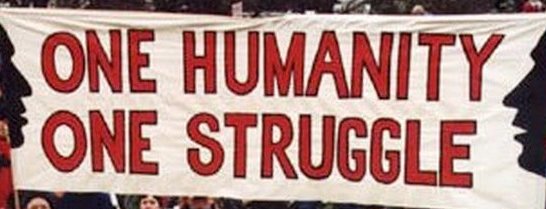
134th Anniversary of the Hanging of Louis
Riel
• Infamous
Day in the History of Canada
• Liberal
Apologies for the Hanging of Louis Riel
Thirty Years Since the Fall of the Berlin
Wall
- Pauline Easton -
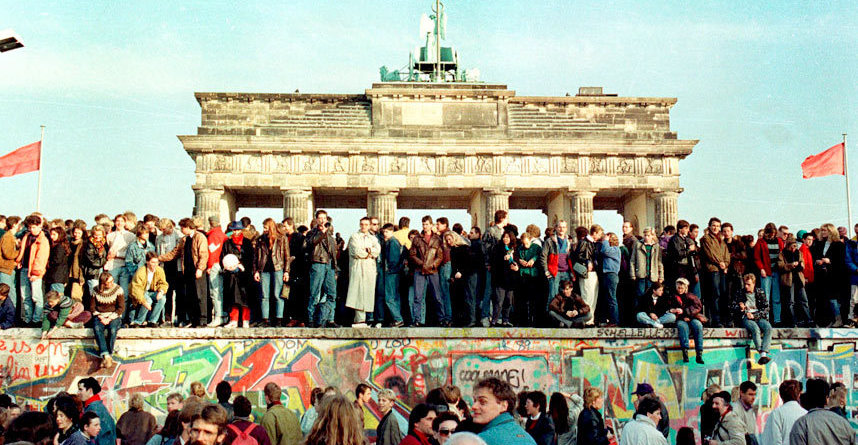
Berlin, the day after the fall of Berlin Wall, November 9, 1989.
November 9 marked the 30th anniversary of the fall of the
Berlin Wall. It was one of a series of events in 1989 that
seized the imagination of the entire world. First came the
agreement in Poland that year between the government and the anti-communist
workers' organization called Solidarność. Then in November, the Berlin Wall
was torn down and in December, Nicolae Ceaușescu and
his wife were brutally executed in Romania. Within two years the
Soviet Union had collapsed, changing the map of the world.
In 1990, the Organization for Security and Co-operation
in Europe (OSCE), the U.S. and Canada adopted the Charter of Paris for
a New Europe (Paris Charter) which declared the shared values of the
only kind of democracy they would accept in changed circumstances.
Henceforth, any country which did not adopt a market
economy, a multiparty system and the U.S. imperialist definition of
human rights was to be targeted for "regime change." On this
basis, the counterrevolutionary forces established political systems in
which the triumphant capitalists placed both "radicals" and
"conservatives" in government while the anti-worker, anti-people policy
remained the same. So-called colour revolutions were organized
along with military aggression when this did not succeed in
bringing about the changes the forces promoting the counterrevolutions
demanded.
Euphoria, euphoria and more euphoria was the order of the day
30 years ago for the bourgeoisie. Everything would be set right. A massive
campaign against communism was launched on an unprecedented
scale.
But the euphoria that accompanied the fall of the Berlin Wall soon evaporated as the working class in the
countries of both eastern and western Europe, and the entire world,
could see that the changes which took place did not favour the
working people.
Within a matter of five years, the result was war in Bosnia,
the Russian invasion of Chechnya, Georgia's claims on Abkhazia,
Armenians and Azeris fighting over Nagorno-Karabakh, and massive
unemployment and the accumulation of poverty on one pole and the
accumulation of riches on the other.
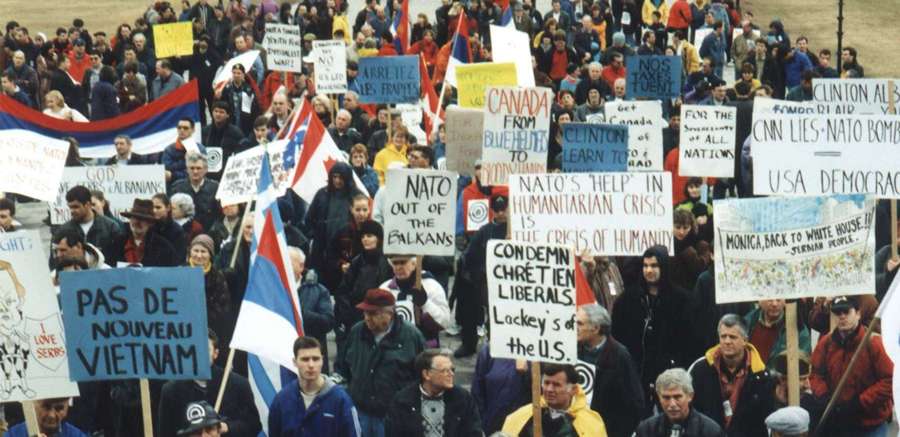
Demonstration in Ottawa against U.S.-led NATO war against Yugoslavia, April 17, 1999.
During these 30 years since the fall of the Berlin Wall
and
the so-called liberation of eastern Europe and the collapse of the
former Soviet Union, the retreat of revolution has permitted the
rampage of the neo-liberal anti-social offensive. The U.S.
striving for world domination has expanded the membership of the
U.S.-led NATO military alliance, as well as its reach, beyond the
borders of the North Atlantic. With the help of its NATO allies,
the U.S. has launched multiple wars of aggression and occupation,
causing hundreds and thousands of deaths and destruction. Under the
pretext of war on terrorism, regime change, destruction and rule by
exception are presented as the "new normal."
In all the
allegedly democratic countries where the rule of the
international financial oligarchy prevails, the working people
are subjected to the worst treatment by the monopolies and
oligopolies and the governments they have taken over. This
onslaught against the working class, against the communist and
workers' movement, against the broad masses of people of Asia,
Africa, Latin America and the Caribbean, is facilitated by the
disinforming role of the state and its agencies and all those who
seek to hold on to positions of power and privilege within the
capitalist world order.
Today, the international financial oligarchy has usurped the
powers of national states to impose supranational narrow private
interests. It rules through cartels and coalitions disguised as
governments. The more they usurp power and try to establish their
hegemony over their rivals while keeping the people in check,
the more they rule by exception in the name of national security
and the national interest, while the more vain become their attempts to
manipulate elections to stave off the civil wars raging within
the own ranks, and the more obvious that their rule is
superfluous. Modern institutions are required which realize the
striving of the people to humanize the natural and social
environment and to make sure peace prevails.
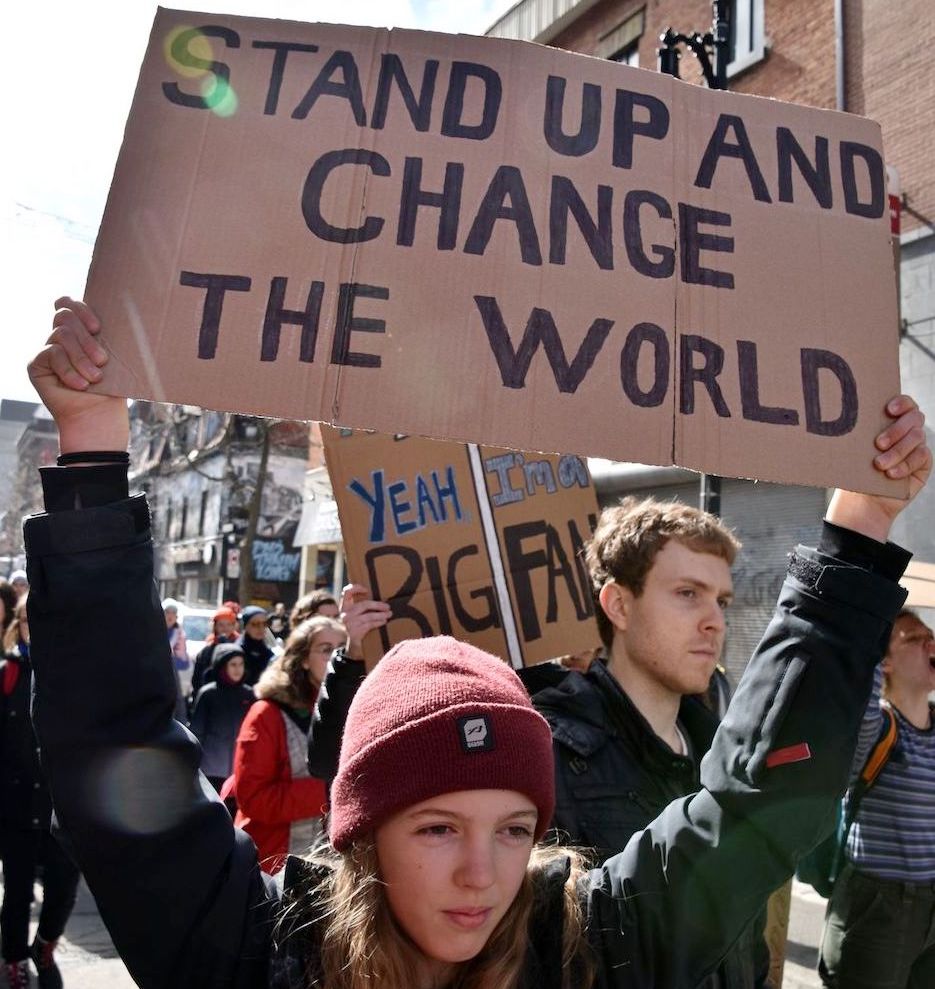 Thirty years ago, the bourgeoisie, imperialism and world
reaction manipulated the broad discontent with
pseudo-socialism of the peoples in the former Soviet Union and the people's
democracies of eastern Europe to install the capitalist system.
Today, the discontent of the masses of people everywhere with the
neo-liberal capitalist world order is such that the bourgeoisie,
imperialism and world reaction are once again doing their utmost
to manipulate this discontent to rescue their bankrupt liberal
democratic institutions and stave off the consequences of the
anarchy that exists, which they cannot control. Thirty years ago, the bourgeoisie, imperialism and world
reaction manipulated the broad discontent with
pseudo-socialism of the peoples in the former Soviet Union and the people's
democracies of eastern Europe to install the capitalist system.
Today, the discontent of the masses of people everywhere with the
neo-liberal capitalist world order is such that the bourgeoisie,
imperialism and world reaction are once again doing their utmost
to manipulate this discontent to rescue their bankrupt liberal
democratic institutions and stave off the consequences of the
anarchy that exists, which they cannot control.
Once again media reporting on the significance of the fall of
the Berlin Wall is intent on drowning out any discussion of the real
problems which require real solutions. The need for democratic
renewal is forgotten in a false debate that juxtaposes the
dogmatic rendering of communism and socialism and the dogmatic
rendering of capitalism. All of it merely emphasizes the
absurdity and superficiality of the bourgeoisie's discourse. It
brings to the fore their arrogant disconnect with the real
problems that required solutions 30 years ago and still need to
be addressed today, more urgently than ever. It cannot be
otherwise because what is being celebrated is the usurpation of
the movement of the workers and peoples to exercise control over
their lives in the name of "freedom" and "democracy."
The promise of "freedom" has turned into the wars of
occupation and aggression carried out by the U.S. imperialists
and their NATO allies along with other big powers. It takes the
form of murderous sanctions, the caging of children, violence
against women and families, the brutal murders of Indigenous peoples
as we see in Bolivia, trafficking in human beings as cheap labour,
and a new world order where prerogative powers are used to impose
arrangements that do not have the consent of the peoples.
National interest and national security are cited to justify
plunder, stepped up exploitation and criminalization. Rational
political discourse which unifies the polity and opens a path to
progress is absent because political parties have become a cartel
party system without members, legislatures are no longer vehicles
which are seen to express national sovereignty, and bodies politic
are destroyed in the name of high ideals. The upshot is anarchy
and violence and the further marginalization of the people from
the decision-making process.
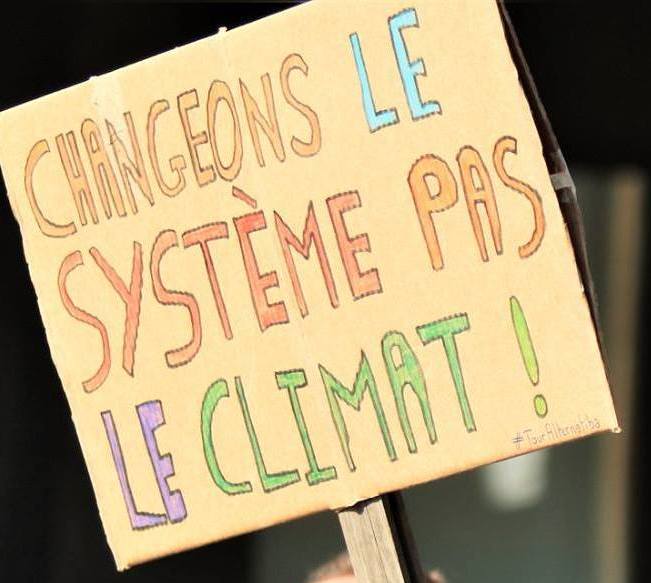 The only success stories people are told are those of a tiny
handful of billionaires, which in fact serves to underscore the
trend of the rich getting richer and the poor poorer. People
from the former East Germany openly say that the freedom they
achieved is the "freedom to buy consumer goods" while their
profound desire to exercise control over their lives is as remote
as ever. The united Germany, in rivalry with France and Great
Britain, has become a main contender with the U.S. for control
over Europe, Africa and Asia. The only success stories people are told are those of a tiny
handful of billionaires, which in fact serves to underscore the
trend of the rich getting richer and the poor poorer. People
from the former East Germany openly say that the freedom they
achieved is the "freedom to buy consumer goods" while their
profound desire to exercise control over their lives is as remote
as ever. The united Germany, in rivalry with France and Great
Britain, has become a main contender with the U.S. for control
over Europe, Africa and Asia.
Thirty years after the fall of the Berlin Wall, all the
euphoria about the fall of communism and the victory of
capitalism has nothing to show for it. To divert attention
from the state of the capitalist-imperialist world, the ruling
elite, in addition to equating pseudo-socialism with communism,
are targeting communist ideology as hate ideology that motivates
violence. To stop people speaking their minds for fear of
reprisals, the propaganda is still carried within the perspective
of the Cold War that a "free market economy" and ideological and
political pluralism are superior to communism. What is the
reality on the world scale? What is such a reality telling us?
What needs to be done to solve the serious problems which face
societies and humankind?
The fact is that all over the world people are demanding
change; a broad disaffection exists everywhere. What is the
content of the democratic renewal, which is the fundamental demand
of the peoples, and what form should it take?
The aim of the propaganda that communism has failed is to encourage
those who say either that communism is all wrong or those who
claim that the liberal democratic institutions can be made to
function without corruption, and to get the people to side with one
or the other. As is the case in all other spheres, a diversion is
created between two false opposites.
Having gone through such a tumultuous period, the world has
learned that the problems it faces are not a matter of a
fight between dogmas. It is a matter of what is happening in this
world itself. What is the stage of its development and what
should be done about it?
Democratic renewal is the main content of this period. It
surpasses all other considerations and is the banner which is
bringing new forces onto the centre-stage of history. Millions
upon millions of people have direct experience with their
conditions of life and work and they perceive their reality not
through the eyes of dogmas but by paying with their hides.
 The diversionary discourse about the "victory of democracy"
over "communism" was used to create euphoria 30 years ago, while
today it is aimed at keeping the old forces and old content in
power even though under today's conditions there is no place for
these old forms and old content. Since 1989, governments called "radical," "conservative," "right-wing," "left-wing" and
"centrist" have worked to sabotage democratic renewal and lead their people right into the arms of the
world's greatest enemies. The diversionary discourse about the "victory of democracy"
over "communism" was used to create euphoria 30 years ago, while
today it is aimed at keeping the old forces and old content in
power even though under today's conditions there is no place for
these old forms and old content. Since 1989, governments called "radical," "conservative," "right-wing," "left-wing" and
"centrist" have worked to sabotage democratic renewal and lead their people right into the arms of the
world's greatest enemies.
The new period that was irresistibly ushered in by the changes
which took place so rapidly 30 years ago showed that no force
could continue to act in the old way. The conditions surpassed
the necessity for old forms, which have passed away, while new
forms have yet to be brought into being. The new conditions bring
forth an agenda of their own, independent of anyone's will, in
the form of the demand of the peoples to exercise control over
their lives as peoples and as individuals and over their destiny
as nations. It is the struggle for the right to be of
individuals, collectives and entire societies and nations,
including oppressed nation-states, which we see today. Since 1989
the consciousness of the peoples worldwide rejects the
abandonment of individuals to fend for themselves, the
marginalization of the peoples in decision-making and the
suppression of the right of nations to self-determination.
It is the agenda for democratic renewal which has been put on
the table of the world for solution. This is the demand of
millions upon millions of people all over the world, in
developing countries but also and notably in the so-called
advanced economies which are mired in crisis and where the weight
of the old arrangements is exhausting the people as never
before.
To Humanize the Natural and Social Environment -- All Out for Democratic Renewal!

134th Anniversary of the Hanging of Louis
Riel

Métis leader Louis Riel (centre) surrounded by councillors of the Métis Legislative Assembly
of Assiniboia.
On November 16, 1885, the British colonial power executed
the great Métis leader Louis Riel. Riel had been charged and
found guilty of high treason after the Métis were defeated at the
Battle of Batoche in May of that year. The execution of Louis
Riel was intended as an assault on the consciousness of the Métis
nation, but was unsuccessful in putting an end to their fight for
their rights and dignity as a nation. The struggle of the Métis
to affirm their right to be and exercise control over their
political affairs continues to this day.
The two great uprisings of the Métis -- the Red River Uprising
(1869-1870) and North-West Uprising (1885) -- were not isolated
events but took place at a time when the Indigenous nations and the
Quebec nation were also striving to affirm their nationhood, and
at a time of revolutionary ferment in Europe. The Métis'
uprisings represented a response to the colonial project that
sought to reproduce the British state in North America and block
the legitimate aspirations of the nations that comprised
Canada.
The British North America Act of 1867 and the federal
government's purchase of Rupert's Land from the Hudson's Bay
Company in 1869-1870, juxtaposed with the decline of the
traditional Métis economy based on the buffalo hunt, forced the
Métis to engage in a power struggle with the colonial authorities
and negotiate Manitoba's entry into the Confederation after the
establishment of a Legislative Assembly. The spirit that
motivated Riel and the members of the provisional government at
the time is contained in the Declaration of the Inhabitants of
Rupert's Land and the Northwest that affirms the sovereignty of
the Métis over their lands. The latter also refused to recognize
the authority of Canada, "[...], which presumes to have the right
to come and impose on us a form of government even more
incompatible with our rights and our interests [...]."
The Manitoba Act, which established that province, was
voted on and passed in the federal Parliament in May 1870. The
government wasted no time in exerting control over its new
territory as evidenced by the Wolseley military expedition later
that year -- which led to Riel fleeing to the U.S. for fear of
his safety -- the creation of the North-West Mounted Police (1873),
and the Indian Act (1876). Prime Minister John A. Macdonald
championed the colonization of the west and the development of
agriculture with the national policy he had
been promoting since 1878. With the help of the Oblates (lay members of the
Catholic Church affiliated with a monastic community), the
authorities sought to settle the Métis and force them to adopt an
agricultural lifestyle. Facing an existence within this rigid
framework and under pressure from land speculators, some Métis
sold the land that had been granted to them and settled in
Saskatchewan.
This was a period when nationalism was in the air. The
events
in Manitoba alerted Quebeckers to the fragility of the Métis'
situation, while the abolition of the teaching of French in New
Brunswick in 1871 indicated the need for organization. National
organizations to defend the rights and interests of Francophones, such
as the Saint-Jean-Baptiste Society, spread across the
continent with the waves of migration from the St. Lawrence
valley. The National Convention of Montreal in 1874 and the
Saint-Jean-Baptiste celebrations in Quebec in 1880 and Windsor in 1883
brought together delegations from all of French America in a
strong show of the vitality of the "French-Canadian family."
Acadians held their first convention in 1881 where they held a
celebration and adopted a national doctrine.

Métis won a victory at the Battle of Fish Creek, April 24, 1885. Lithograph by Fred Curzon.
Métis leaders, under the sway of the Church at that time, did
not rock the boat. In the aftermath of the Red River resistance,
the Saint-Jean-Baptiste society of Manitoba was founded in
Saint-Boniface, Manitoba. Its vice-president was none other than
Louis Riel. This association included in its infancy as many
French Canadians as Francophone Métis.
However, aware of their distinct identity, Métis leaders
wished to forge their own nationalism. Riel would come to
articulate a Métis nationalism, with its own holidays and
national symbols. This process would culminate in the creation of
the Métis National Council at Batoche in September 1884, to
promote the development of their political consciousness.
The Métis once again took up arms to affirm their nationhood
and right to be in the North West Rebellion of 1885. For three
days between May 9 and May 12, 1885, 250 Métis fought valiantly
against 916 Canadian Forces at the Battle of Batoche but were
defeated and Riel surrendered.
Macdonald and his cabinet took a hard line with respect to
Riel and his compatriots. Riel was tried in Regina over five days
in July 1885. After half-an-hour's deliberation he was found
guilty of treason by the jury, which recommended mercy.
Nevertheless, Judge Hugh Richardson sentenced him to death. From
September 1885 to October 1886, Riel and several of his comrades,
all Indigenous, would be condemned to hang.

Louis Riel's address to the jury in Regina courtroom, July 1885.
While times have changed, the Canadian state has inherited the
colonial power and it persists in the aim of negating the
nationhood of the Métis, Indigenous nations and Quebec. The proud
history of the Métis and their fight to affirm their rights and
nationhood is not some historical artifact gathering dust, but
continues to gleam brightly in the light of the present day. The
fight to affirm rights that belong to people by virtue of their
being human is precisely the fight for modern, human-centred
arrangements. Louis Riel's life epitomized the fight for the
recognition of rights on a modern basis.
Louis Riel's life is an important legacy that is as relevant
as ever at this time when the Canadian state is doing its utmost
to negate the rights of the Métis, Indigenous nations and the Quebec
nation, as well as the workers, women, youth, national minorities
and all the collectives in the society, all in the name of
security, balance, austerity and other phony high ideals.

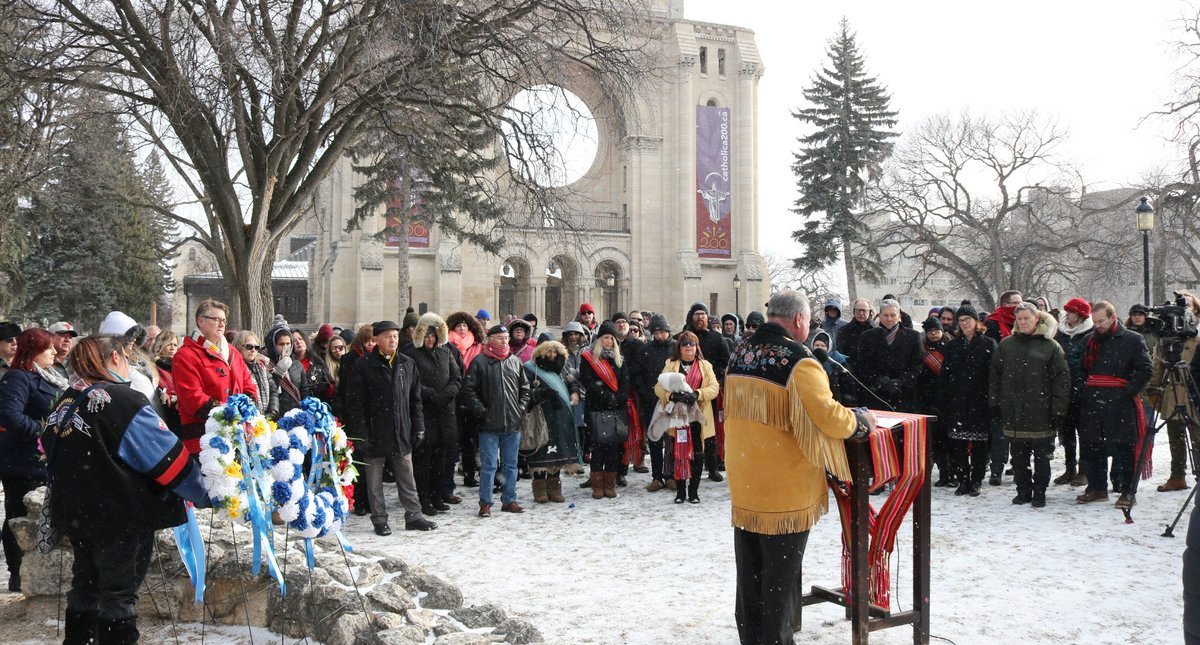
Manitoba Métis Federation's annual commemoration of Louis Riel's
at his grave site on the anniversary of his death, November 16,
2018. (Manitoba Métis Federation)
The 134th anniversary of the cowardly hanging of the great
leader of the Métis people, Louis Riel in 1885 once again brings
to mind the hyprocrisy engrained in the minds of those who seek
to defend Canada's liberal democratic institutions under whose
aegis crimes were committed in the past in the name of high
ideals and national interest and continue to be committed today
in the name of high ideals and the national interest. Just as in the
1870s and 1880s, the Métis nation was fighting for its
sovereignty, which clashed with John A. Macdonald's vision of a
Canada stretching from sea-to-sea-to-sea, so too today, the
demands of the Canadian people and Indigenous nations clash with
the Trudeau government's vision of Canada as the private property
of supranational oligopolies, the U.S. imperialists and its NATO
war-mongering military alliance. At the time of the Métis
Rebellion, Manitoba served as the gateway to the settlement of
the West and a hub of the transcontinental railway. The "founding
fathers" created the North-West Mounted Police, later the RCMP, to
suppress the nation led by Louis Riel, giving Manitoba the
dubious honour of contributing to the establishment of the forces
of "law and order" in Canada.
During the week of December 9-13, 1996, the federal parliament
debated Bill C-297, a bill to revoke the conviction of Louis
Riel, who was hanged for "treason" following the defeat of the
1885 North-West Rebellion. The private member's bill, introduced by MP Suzanne Tremblay
(Bloc Québécois: Rimouski-Temiscouata) on October 21, 1996, was
narrowly defeated. Tremblay had introduced a similar bill in
November, 1994 but it too was defeated. In fact, the defeat in
December 1996 was the seventh time since 1983 that such a bill
had been introduced in Parliament and defeated.
When the bill was defeated for the seventh time, most Liberal
MPs voted against it. Not a single Cabinet member voted for the
bill and several prominent Liberal ministers were reported to
have run up the stairs to avoid having their vote recorded. Among
those voting against the bill were several Liberal MPs from
Manitoba. One of them, John Harvard (Winnipeg-St. James), was
asked why he had voted against the measure, despite almost
universal support amongst Manitobans. He stated that he did so
because the Bloc Québécois had a "hidden agenda" in introducing
the bill and intended to use it to generate support for
"separatism." He went on to claim that the Liberal government
would be reintroducing a similar bill in the next session, one
which would clearly identify Louis Riel as a "Father of
Confederation" and a defender of Canadian unity.
TML Daily wrote at the time:
"Louis Riel was not a 'Father of Confederation.' Far from it,
he spent most of his life opposing the Confederation and the
attempts of the Anglo-Canadian state to extinguish the Métis
nation and the hereditary rights of Aboriginal peoples. Within
the historical conditions of the times, he stood for the
sovereignty of the peoples and fought for the unity of the Métis,
Natives and settlers against the Anglo-Canadian colonial state.
He actually led the peoples of the West to establish their own
state to defend their interests against both the westward
expansion of Canada and the northward expansion of the United
States. To suggest that Riel stood for Confederation or for some
abstract 'Canadian unity' is to distort history and to completely
negate Riel's contribution to the struggles of the Métis and
other Aboriginal peoples for their rights.
"Louis Riel would certainly make a strange 'founding father,'
a 'founding father' hanged by other 'founding fathers' and their
descendants! The disgusting behaviour of the Liberal government,
which continues to defend the colonial legacy of the Canadian
state, the murder of Riel and the devastation of the Métis nation
under the hoax of someone else's 'hidden agenda,' proves that
this government cannot even reconcile itself to the best that the
nineteenth century had to offer, let alone lead Canada into the
twenty-first century."
On January 7, 1998, the government finally issued a "Statement
of Reconciliation," which read: "No attempt at reconciliation with
the Aboriginal people can be complete without reference to the
sad events culminating in the death of Métis leader Louis Riel.
These events cannot be undone; however, we can and will continue
to look for ways of affirming the contributions of Métis people
in Canada and of reflecting Louis Riel's proper place in Canada's
history."
The statements about Louis Riel made in 1996-97 clearly
exposed the fact that it was the Chrétien Liberals who had the
hidden agenda. TML Daily concluded at the time by pointing
to the pathetic nature of attempts by the Liberal Party to
distance itself from empire-building because it is not
"politically correct," while maintaining the policy of colonial
rule. The Liberal policy is no different today under
Justin Trudeau. To this day, the Liberals cannot face the modern
world of democratic renewal. In Canada, their high-sounding words
about reconciliation and restoring nation-to-nation relations are
to cover up maintaining the colonial relations enshrined in a
Constitution which does not vest the decision-making power in the
citizenry. It can be seen in
the heinous racist acts committed by Canada to dispossess the Indigenous peoples at home and, abroad, to overthrow the
Plurinational State of Bolivia where the first Indigenous
president restored the dignity of the Indigenous peoples after
centuries of discrimination and oppression under the aegis of
racist Indian Acts.

(To access articles individually click on
the black headline.)
PDF
PREVIOUS
ISSUES | HOME
Website: www.cpcml.ca
Email: editor@cpcml.ca
|

